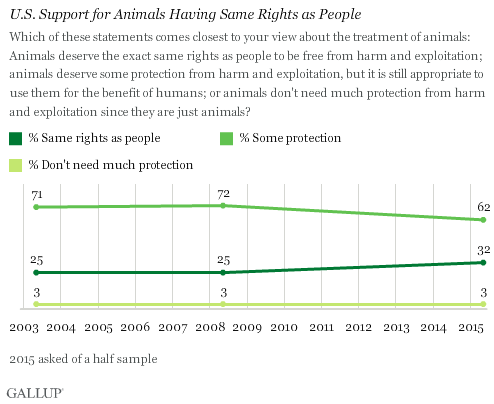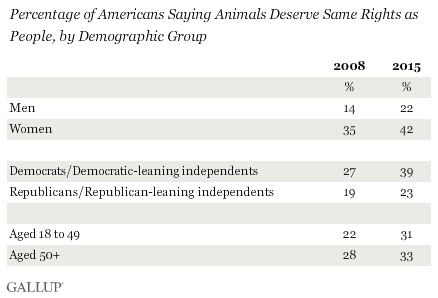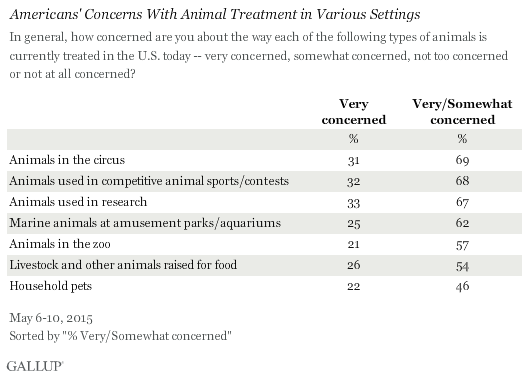Story Highlights
- A third of Americans want animals to have same rights as people
- Support for this view up from 25% in 2008
- Majority, 62%, say animals deserve "some protection"
In U.S., More Say Animals Should Have Same Rights as People
WASHINGTON, D.C. -- Almost a third of Americans, 32%, believe animals should be given the same rights as people, while 62% say they deserve some protection but can still be used for the benefit of humans. The strong animal rights view is up from 2008 when 25% thought animals' rights should be on par with humans'.

Very few Americans, 3%, believe animals require little protection from harm and exploitation "since they are just animals." But, as noted, a modestly increasing minority now believe animals should have the same protection from harm and exploitation as people. Gallup first asked Americans about the rights of animals in 2003 and repeated the question in 2008 and again in the latest May 6-10, 2015, poll.
The percentage of Americans who support the idea that animals' rights should be equal to those of humans increased across all major U.S. demographic groups. Women remain more likely to support this view than men do, but support among both groups has increased by a similar amount since 2008. Similarly, Democrats and Democratic-leaning independents are more supportive of this view than Republicans and Republican-leaning independents are, but both groups have seen an increase from the last time Gallup asked them. There continues to be little difference between younger and older Americans.

Most Concern for Treatment of Animals in Circuses, Sports, Research
To further discern Americans' feelings about animal rights, for the first time, Gallup asked Americans about their level of concern for the treatment of animals in various settings. The percentage saying they are "very" concerned ranges from 33% for animals used in research to 21% for animals in the zoo. When combined with those "somewhat" concerned about each, Americans are most concerned about animals in the circus, animals used in competitive animal sports or contests and animals used in research, with just over two-thirds expressing concern about each. They are least concerned about the treatment of household pets, with 46% saying they are very or somewhat concerned.

Overall, Americans are a bit less concerned about the treatment of marine animals in amusement parks and aquariums (62% are very/somewhat concerned) and animals in the zoo (57%) than about the treatment of circus animals.
The level of concern for marine animals is especially intriguing after documentaries such as Blackfish claimed to expose the truth about the treatment and status of animals in captivity. After the release of Blackfish, the stock price of SeaWorld dropped substantially, and some lawmakers have discussed banning the use of orcas in shows.
And despite increasing attention focused on the treatment of chickens, cows and other animals mainly used for human food -- as exposed in the 2008 documentary Food, Inc. -- Americans show relatively less concern for how these animals are treated, with 54% at least somewhat concerned, including 26% very concerned.
While the fewest Americans are concerned about the treatment of household pets, still close to half are very or somewhat concerned. This may be prompted by publicity aimed at stopping cruelty toward pets, including a long-running, poignant commercial for the American Society for the Prevention of Cruelty to Animals (ASPCA) showing abused and neglected dogs and cats.
Bottom Line
Animal rights have been top of mind for Americans in recent years because of an increasing number of films and news stories depicting the poor treatment of animals. Congress requested a review of a government-funded animal research lab in late 2014, and cosmetics testing on animals was banned in the European Union in 2013. Ringling Brothers recently announced that it will retire its circus elephants by 2018, a decision that comes after years of allegations of animal abuse and complaints that circus acts are disrespectful to animals. Organized segments of the American public are very vocal about protecting animal rights, with groups such as People for the Ethical Treatment of Animals (PETA) even creating advertisements for prime-time events such as the Super Bowl.
Traditionally, the Bible gives humans domain over animals, and specifies that animals don't have souls -- but also warns that righteous men should have regard for the lives of their animals, a view that could still influence religious Americans.
While it is not clear which, if any, of these factors have influenced public opinion, it is clear that Americans have become more likely to believe that animals should have the same rights and protections as people, though this still remains the minority viewpoint.
Survey Methods
Results for this Gallup poll are based on telephone interviews conducted May 6-10, 2015, on the Gallup U.S. Daily survey, with a random sample of 1,024 adults, aged 18 and older, living in all 50 U.S. states and the District of Columbia. For results based on the sample of 497 national adults who were asked about the protection of animals, the margin of sampling error is ±5 percentage points at the 95% confidence level. For results based on the sample of 527 national adults who were asked about their concern for animals in various settings, the margin of sampling error is ±5 percentage points at the 95% confidence level. All reported margins of sampling error include computed design effects for weighting.
Each sample of national adults includes a minimum quota of 50% cellphone respondents and 50% landline respondents, with additional minimum quotas by time zone within region. Landline and cellular telephone numbers are selected using random-digit-dial methods.
Learn more about how Gallup Poll Social Series works.
No comments:
Post a Comment